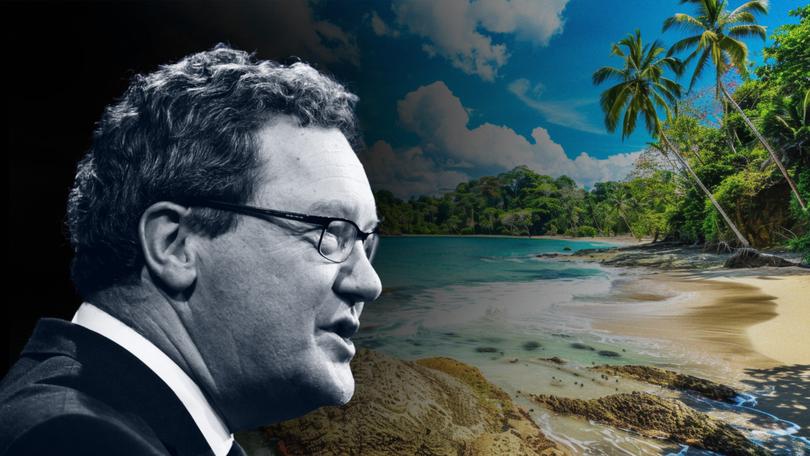LATIKA M BOURKE: Former foreign minister Alexander Downer blasts Caribbean countries’ reparation call
Australia’s longest-serving foreign minister delivered a blunt reply when asked about the hot topic for the Commonwealth Heads of Government meeting.

Australia’s longest-serving foreign minister Alexander Downer has blasted the Commonwealth countries demanding the British pay reparations for colonialism and questioned if the UK should be repaid the billions it has spent on foreign aid in return.
The UK’s new Prime Minister Keir Starmer has ruled out Britain paying its former dominions slavery and colonial compensation ahead of the Commonwealth Heads of Government Meeting (CHOGM) underway in Samoa.
But the issue of reparatory justice, led by the Caribbean countries has gained traction in recent years.
Sign up to The Nightly's newsletters.
Get the first look at the digital newspaper, curated daily stories and breaking headlines delivered to your inbox.
By continuing you agree to our Terms and Privacy Policy.All three candidates vying to become the body’s new Secretary-General support reparations.
Former foreign minister Mr Downer, who also served as Australia’s High Commissioner to the UK and maintains deep connections within the Commonwealth community, said those countries demanding cash were absurd.
“Reparations, for what?” Mr Downer said during an interview with The Nightly.
“I mean, what about them paying?
“Do you think there should be compensation for all the money the British government has spent over the years on helping these countries get started and make their way in the world?
“It’s absurd, of course not.
“But if you want a debate about the absurd I’ll give you a debate about the absurd.”

Mr Downer said the issue of reparations was directly raised by a representative of Buckingham Palace at a dinner he attended in London which was held to discuss ways to fire up the Commonwealth which critics say achieves little and has no clear objectives.
“And I said ‘Well, I come from Australia and I mean this might be or might not be an issue between the UK and some of the Caribbean countries who seem to be using this as a bit of a campaign for money’,” he said.
“But I said ‘It’s not something that affects the whole of the Commonwealth and it’s not a debate that’s of any interest to a country like mine or New Zealand or India’.
“We’re not all looking for reparations.”
Mr Downer said the dinner conversation left him “slightly shocked” and he believed the Palace was equally taken aback by his outright dismissal of the idea.
But he blamed it on what he said was elite embarrassment of the Commonwealth project.
“The problem has been the British Foreign and Development and Commonwealth Office sees the Commonwealth as a relic of Empire,” he said.
“And of course the narrative of those elites in the civil service and most people in the political class, the narrative is now to say that they’re ashamed of the British Empire.”
Eamonn Courtney, who served as foreign minister of Belize from 2020 until the end of last year, said Mr Downer’s comments were ill-informed and disappointing.
“Mr Downer’s comments are regrettable,” Mr Courtney said.
“The Declaration on Reparatory Justice proposed by CARICOM member countries of the Commonwealth is requesting Heads to agree that the time has come for respectful, meaningful, and truthful conversations on Reparatory Justice.
“This is not asking for reparations.
“CARICOM is asking for a start to an overdue conversation to inform a path forward, and it is one which the region believes should be facilitated by the Commonwealth, given its origins in Empire but also as a champion for decolonisation and anti-racism.
“Mr Downer seems to have a philosophical problem with reparatory justice as a basis for reparations.
“Unlike him, I believe that Commonwealth member countries are mature enough and enlightened enough to grapple with this historical, moral and legal wrong.”
Three African candidates are wooing the 56 member states for votes ahead of this week’s secret ballot at CHOGM.
They are Ghana’s former Foreign Minister Shirley Botchwey, The Gambia’s former Foreign Minister Mamadou Tangara and Joseph Setipa, former Trade Minister of Lesotho.
Mamadou Tangara said reparations were a “duty to correct some of the mistakes of the past” and that he fully supported the idea.
“It’s a battle that is worth fighting,” he told the London foreign policy think tank Chatham House.
Joshua Setipa said the conversation had widened to look at the toll of climate change as well as the international financing system and that reparations should be dealt with in that context.
Shirley Botchwey said she stood for reparations but also argued that the issue had moved beyond financial compensation to involve climate justice and financing.
“We’ve all moved from financial reparations and this is what this country is getting, now to what we can get out of – in terms of our development, in terms of our resilience building, whether it’s climate, whether it’s economic,” she said.

